The weaponisation of memory: why Russian courts are re-convicting Stalin’s victims
The BBC uncovers a systematic, secretive and accelerating move to overturn the exoneration of men and women imprisoned or executed in Soviet times.
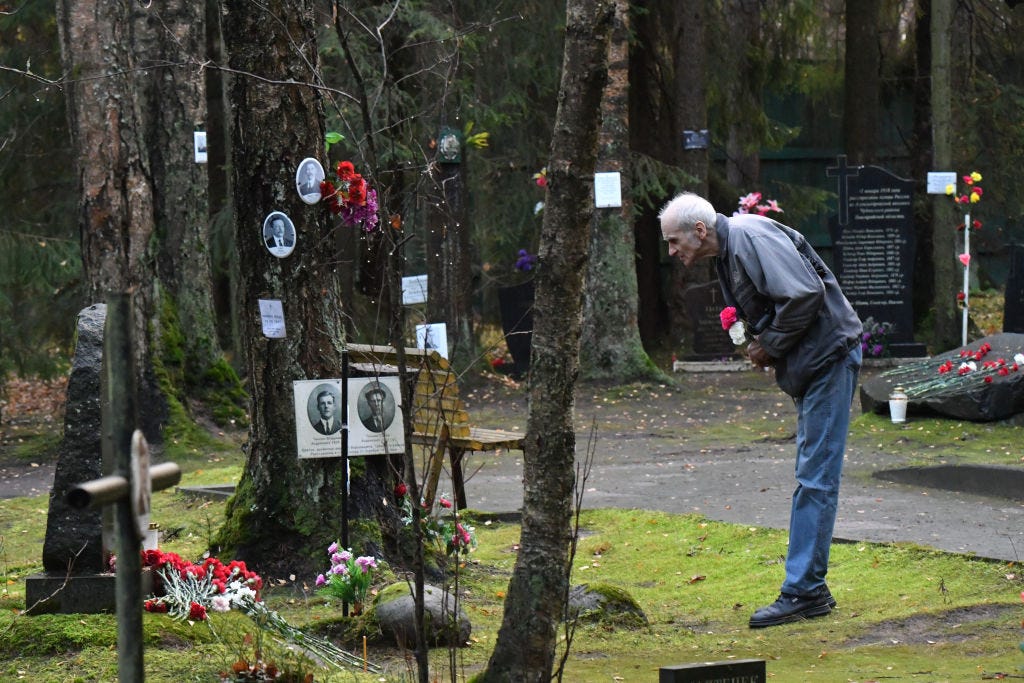
At the height of the Stalin-era purges and terror, to speed up proceedings and meet quotas required for guilty sentences, hastily-arranged ‘troikas’ - three-man secret police trials, in which the presiding officers played both judge and jury – churned out countless verdicts.
Hearings were generally secret, detainees were forced to bear witness against themselves, and there was no right of appeal. Victims were despatched to the Gulag; or with a bullet in the back of the head.
After the whirlwind passed, the Soviet government, and later the Russian state, to different degrees supported efforts to uncover the extent of the mass persecutions, identify the victims, and exonerate those subjected to summary ‘justice’.
Seen as vitally important to the country’s future, the work nevertheless remained incomplete – deadlines passed, and commitments made in the past were easily ignored.
But in the past few years, the identification of victims has picked up speed again, at the urging of top officials. Only this time, the purpose of the review is quite different: to deny the rehabilitation of many of those classed as ‘repressed’; or indeed to reverse it.
Once again, the procedure is being pursued in secrecy.
BBC Russian reveals how the new ‘conveyor belt’ operates - and why it suits the Kremlin to keep it in motion.
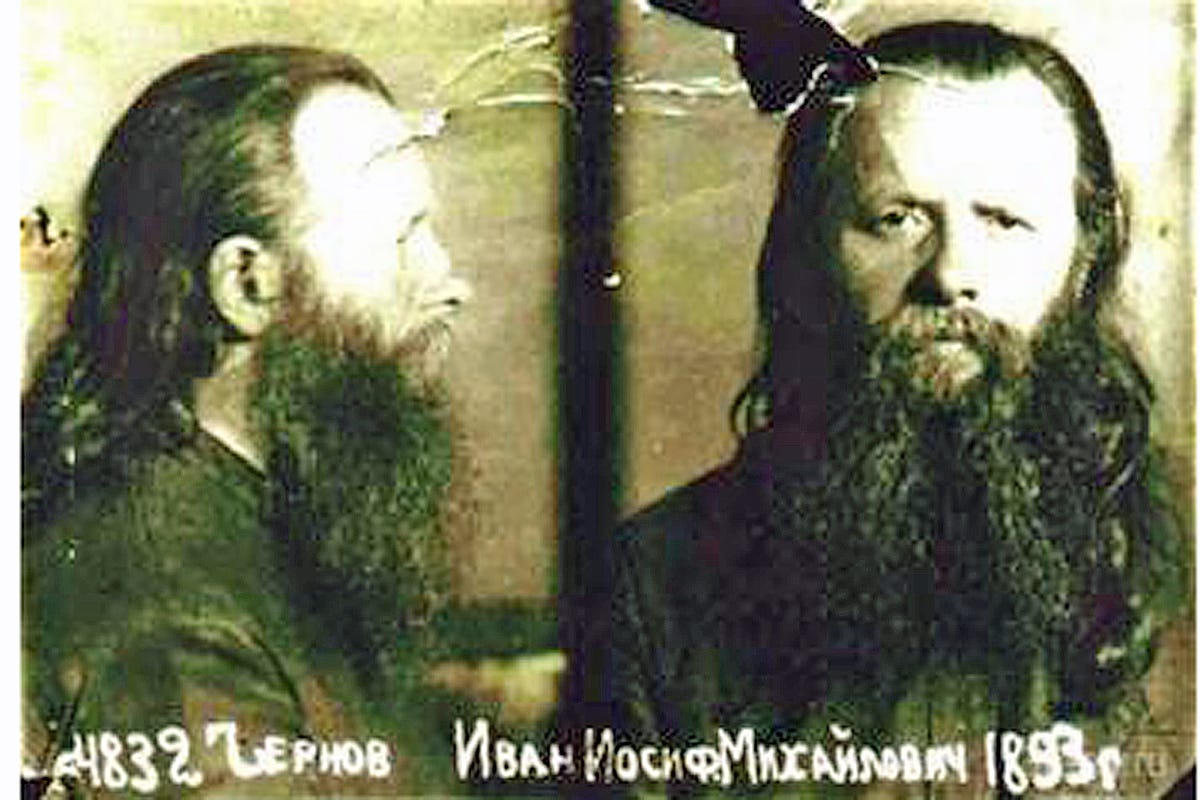
Re-branded ‘Enemies of the Motherland’
The Moscow suburb of Butovo was among the biggest mass execution sites in the Russian capital at the height of the so-called ‘repressions’. A church was built there – the Church of the Holy Martyrs and Confessors of Russia. A year ago, Vladimir Putin visited, and was addressed by Father Kirill Kaleda, the rector of the church.
Kaleda reminded the president that the document governing official remembrance, the State Policy Concept on Commemorating the Victims of Political Repression, was due to expire in 2024. He noted that the steps called for in the document, such as a comprehensive list of victims, and a law to ensure the preservation of burial sites, had yet to materialise.
Father Kirill asked Putin to extend its validity for another five years.
"Undoubtedly, this work has to continue," Putin stated, and called for the document’s extension.
But what should have been a simple ‘technical directive’ resulted in a complete shift of meaning and direction. In June 2024, Russia officially and radically altered its policy towards mass repression, and its victims.

The BBC can reveal that since 2020, Russia’s sole military cassation court has approved requests by prosecutors to declare more than 250 individuals convicted by Soviet secret police ‘troikas’ to be ineligible for rehabilitation. In 17 such cases, the people concerned were previously acknowledged to have been unjustly convicted, but the court has revoked this rehabilitation order – and reinstated the original guilty verdict.
These rulings, issued in the past few years, go unpublished. In half of the cases, even the names of those convicted, or re-convicted, are kept secret.
Other, non-military, courts of cassation are also busy reviewing cases in which political convicts were rehabilitated. We uncovered 40 such incidences in the courts’ databases, at least three of which concerned the revocation of prior exoneration.
On top of that, the Office of the Prosecutor General has itself reported that since 2022, approximately 4,000 verdicts of rehabilitation in historical cases of political ‘repression’ have been revoked. And when the initial move to rehabilitate an individual originated with prosecutors, no further court decision is called for to reverse it. The details of these cases, and the identities involved, remain unknown.
This annulment process is not covered by Russian law. But this has not stopped prosecutors from enthusiastically pursuing it to re-brand political convicts as ‘enemies of the motherland’ for a second time.
Saint or collaborator?
Four years ago, Father Yakov Vorontsov, an Orthodox priest and monk, addressed a conference beneath the gilded domes of Moscow’s Christ the Saviour cathedral – one of Russia’s most high-profile places of worship. The priest spoke in support of the canonisation of Metropolitan Iosif, an archbishop who served the Russian church for almost six decades – and spent almost 20 years in Soviet labour camps.
Highly regarded by the clergy and parishioners of Kazakhstan, where he spent much of his life, Iosif was rehabilitated posthumously in 1992.
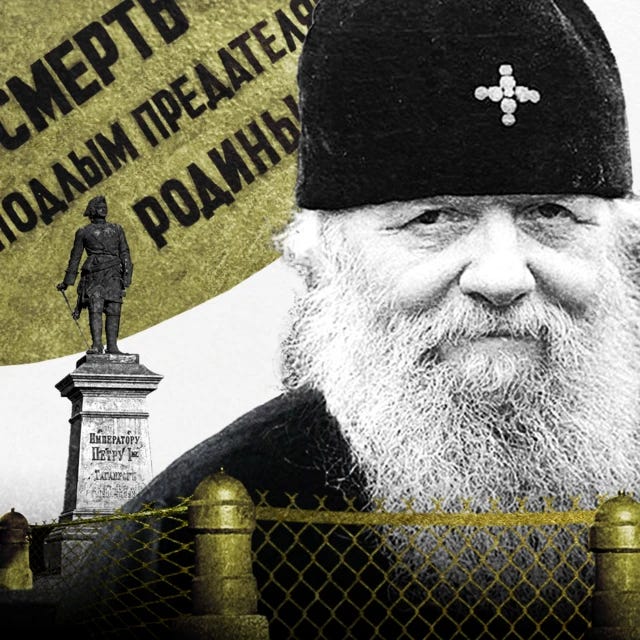
This summer, just a few years after the big ecclesiastical conference in the capital, Father Yakov was himself defrocked – in response to his condemnation of Russia’s invasion of Ukraine. He chose the moment to reveal that the prosecutor in Rostov region had decided to revoke the rehabilitation of Metropolitan Iosif.
It is the first case – at least, the first that has come to light – of a Russian Orthodox Church bishop being treated this way. Yet an official report has yet to emerge from the prosecutor’s office – or from the Church itself.
The former candidate for sainthood was born Ivan Chernov. He was tonsured as a monk in 1918, taking the name Iosif, and serving in the cathedral at Taganrog in southern Russia until 1925 – when he was arrested for ‘spreading false counter-revolutionary rumours’.
He was imprisoned for two years in the far northern province of Komi. His subsequent freedom lasted until 1935, by which time he had been made a bishop; and had become a fierce opponent of moves within the church to align itself closer to the state. At the end of the Nativity fast that year, he was picked up by a black sedan and driven off under arrest. Accused of anti-Soviet agitation, Bishop Iosif was again jailed in the far north.
By the time he was released, in 1940, all the churches in Tagarog had been shuttered, but nobody would offer him other work. He got a job as a watchman, but secretly conducted services for the underground faithful, who in return, hid him from prying eyes when necessary.
When the Nazis occupied Taganrog, Bishop Iosif was allowed to return to his clerical duties: the Germans hoped to use the Church against the Soviets. But he repeatedly refused to speak in support of the occupiers, despite being interrogated several times and threatened. At length, he was to be arrested by the Gestapo, on suspicion of siding with the enemy.
As the Red Army advanced, the Germans decided to rid themselves of prisoners by shooting them. But among the local Gestapo was a Russian of German extraction who decided to help Bishop Iosif, ordering his cell to be filled with bunk beds - and telling the cleric to hide for a few days. The other men were led to their deaths. The paperwork recorded that Iosif was executed, too. But he survived.
Later, Bishop Iosif was summoned to Moscow to meet Patriarch Sergius, only to be arrested en route by the NKVD. They demanded to know how he had survived the Nazi occupation when written records said he had been executed. He was sentenced by a secret police ‘troika’ to 10 years in the Gulag – allegedly for ‘praising the Tsarist regime’.
On release, he remained in northern Kazakhstan, and was allowed to visit churches but not to officiate at services. At length, he petitioned for amnesty, was freed from exile, and appointed Metropolitan Iosif in Alma-Ata diocese, serving until his death in 1975.
Towards the end of his life, Iosif passed over repeated suggestions that he put forward his name for the Patriarchy, saying he was too old. When he died, believers began to collate documents in support of his canonisation.
Metropolitan Iosif has figured in television programmes and books sponsored by the Russian Orthodox Church. A film was made about him. A cultural and spiritual centre was established in the man’s memory in Kazakhstan.
But in 2024, the Russian Prosecutor's Office concluded that Iosif did not merit his rehabilitation.
“Putin’s regime has called a saint of Christ a ‘Nazi collaborator’ - and posthumously condemned him,” Father Iakov wrote. He is now in Kazakhstan himself.
The hunt for traitors in the past
The systematic review of rehabilitation decisions that began in 2020 has come to resemble a conveyor belt, and turns industrially at Russia’s sole military cassation court, situated in Novosibirsk. Of the more than 250 cases of Stalin-era victims reviewed by the court, and identified by the BBC, court records state that every single guilty sentence was upheld.
Peak prosecutorial activity was attained in 2023, while Russia pursued Year Two of its full-scale invasion of Ukraine. We calculated that at least 90 of the cases have involved the Soviet-era charge of “treason against the Motherland”. Another 80 cases were re-examined against the current article of the Russian criminal code concerning treason. In virtually all cases, the names of those jailed or executed have been concealed in the database of court proceedings.
The BBC even found a case of retrospective justice, concerning a crime – ‘confidential cooperation’ with foreigners – that did not even exist until 2022.

Colonel Josef Meiler, a German prisoner of war, was originally convicted of ‘providing aid to the international bourgeoisie’. In 1965, he returned to Germany.
Last year, using the newly-introduced crime of secretly assisting foreigners, Col. Meiler’s guilt was reconfirmed. In absentia, of course.
The military court in Novosibirsk has gone through decisions made by 96 different Soviet agencies involved with the campaign of political ‘repression’ - the Cheka and NKVD commissions, OGPU boards, ‘special departments,’ and military tribunals, including those established in the occupied territories of Germany at the end of World War II and among the Soviet military occupation forces.
All of these bodies, including the ‘troikas’ and ‘special meetings,’ have been recognised by the judges in Novosibirsk as legitimate ‘courts of first instance’. And the judges have agreed with the urgings of today’s prosecutors - and therefore with the sentences handed out by the prosecutors of the past.
"The consideration of cases by extrajudicial bodies such as the troikas could not meet human rights standards," says Grigory Vaypan of the ‘Memorial’ human rights defence centre. "The people convicted by them were deprived of a fair trial. In a perfect world, all the decisions of such bodies should be automatically overturned - and all the repressed individuals should be deemed innocent."
There are nine non-military cassation courts in Russia, brought into existence by the judicial reforms of 2019. They too are pressing ahead with the review of Soviet political justice.

The BBC has found 40 cases buried in websites belonging to the courts. At least two individuals who were convicted of treason were rehabilitated in the 1990s, after the collapse of Soviet power. But Semyon Tsvetkov, a former village elder in the occupied Pskov region, and actress Viktoria Wiedemann, a German by ethnicity, had their rehabilitations revoked in 2023. Viktoria was sentenced to 10 years for treason, and after her release stayed in Vorkuta to work in a local theatre.
The historian Sergei Bondarenko works for the Memorial Society, created by former employees when ‘Memorial’, an organisation founded to research political persecution and honour the victims, was dissolved by a Russian court in late 2021. He sees a “direct parallel” between the actions of the authorities today and the policies of the Soviet Union.
"Just as they are searching for enemies and traitors of the homeland today, they are starting to search for them once again in the past," he says.
A traitor without citizenship
“When it comes to treason, collaboration, swapping sides to the enemy, etcetera – there are so many issues,” comments Sergei Bondarenko. “Starting with the question ‘whose homeland are we talking about in this case?’ It is not a banal or automatic question, one’s homeland.”
Five years ago, the historian Kirill Aleksandrov made an appeal to the military prosecutor’s office on behalf of Mikhail Tarnovsky. A pilot, then prisoner, Tarnovsky had been among the founders of the air force wing of the Russian Liberation Army of General Andrei Vlasov, who had defected to the Third Reich. But Tarnovsky had never been a Soviet citizen – and therefore the charge of treason, for which he was executed, was unfounded.
Tarnovsky was the son of a White officer who had fought the Bolsheviks in the Russian Civil War and fled to Czechoslovakia, where he raised his son. Mikhail became a Czech citizen at the age of 25.
His Russian heritage cost him his job at Lufthansa when the Nazis occupied the country. He was then arrested by the Gestapo, and accused of helping the Czech resistance. Tarnovsky didn’t hide his anti-Soviet views, and the Germans offered him work at a Russian-language propaganda radio station.
A professional pilot, Tarnovsky joined up with Vlasov’s army, which fought alongside the Germans. In March 1945, he took part in a meeting to discuss what to do when the war ended. The decision was to offer the services of the Russian Liberation Army to the Allies. In late April, they surrendered to US forces in southern Germany.
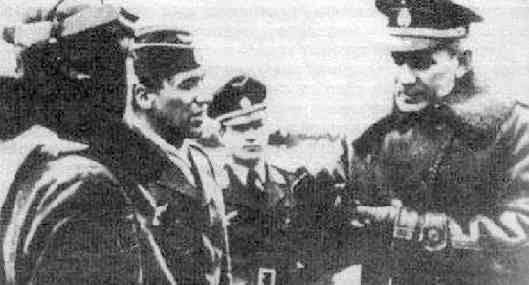
The Americans wasted little time in handing over the captured officers to the Red Army. Tarnovsky was a Czechoslovak citizen, and not subject to this extradition. But he asked to share the fate of his comrades, and followed them into the Soviet occupation zone.
Tarnovsky was arrested by the counter-intelligence service better known by its acronym, SMERSH – Smert’ Shpionam, or Death to Spies. He wasn’t even delivered to the USSR, but held in prison in Potsdam, tried for armed rebellion, and sentenced to execution. The historian Aleksandrov relates that Tarnovsky’s trial lasted an hour and 20 minutes.
The case was first reviewed in 1999. No evidence was found that Tarnovsky or his subordinates had taken part in the killing or torture of Soviet citizens or prisoners, and that therefore his actions “did not constitute any crime against the citizens or interests of the USSR." He had been sentenced "illegally and unjustifiably, on political grounds."
At the time, Tarnovsky was the first and only officer of the Vlasov Army to be rehabilitated.
His historian, Kirill Aleksandrov, who initiated the rehabilitation process, has himself become the target of persecution in Russia. The Russian Ministry of Education and Science revoked the decision to award him a doctoral degree for his dissertation on Andrey Vlasov and his associates.
A court in St. Petersburg declared an article by Aleksandrov on the Ukrainian nationalist Stepan Bandera and his followers to be “extremist”. Aleksandrov does not speak to the press.
The Tarnovsky story was picked up by another historian in 2019, who wrote that the conviction was, in fact, entirely justifiable, and ought not be classed as ‘political’. This article was published again in 2022. In April 2023, the military cassation court upheld the annulment of Tarnovsky’s rehabilitation, following the recommendation of the prosecutor.
There is no way to tell from court case files how many previously rehabilitated individuals have been reclassified as criminals in this way; or for what official reason.
"No one will have access to the case"
In September this year, Prosecutor-General Igor Krasnov issued an order: to streamline work to re-identify criminals among rehabilitated individuals previously classed as victims of Stalinist political persecution. Exoneration was to be annulled, with no exceptions for "justifying collaborators with the Nazis and traitors to the homeland".
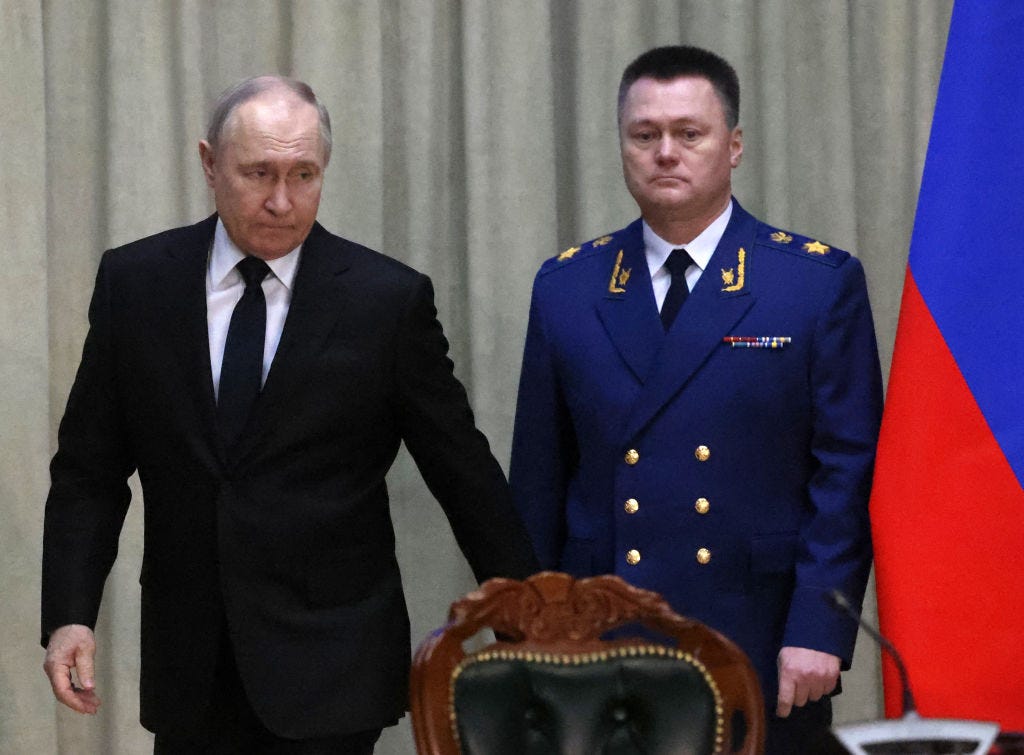
Yet as the lawyer Grigory Vaypan notes, some people who were sentenced for collaborating with the occupying forces had been threatened with violence, or worse, if they refused.
In 1998, the prosecutor's office claimed that in the course of five years, it had reviewed 408,000 criminal cases, restoring the "good name of about 436,000 citizens" and recognising over 281,000 people as victims of repression.
20 years on, the forensic historical work continues – but it is accelerating in reverse.
"The courts always side with the prosecutor, and apart from high-profile cases the authorities want to be publicised, there’s simply no way to discover the names of people whose rehabilitation was denied," says Vaypan. "If rehabilitation is denied, no one will have access to the case."
When cases are reviewed ‘en masse’, the judges simply replicate the logic that initiated the processes back in Soviet times, says Sergei Bondarenko, from Memorial Society.
"I wouldn’t think too highly of their expertise," the historian advises with respect to the mass reconsideration of rehabilitation cases. "It seems to me that they just take these cases and consider them exactly as written, without any critical analysis. In other words, without understanding the context - and without regard to presumptions that are absolutely essential," he adds.
Once a rehabilitation is annulled or denied, the case of the re-repressed individual is classified and sealed, once and for all.
The concept has changed
The state policy for commemorating the victims of repressions was only adopted by the Russian government in 2015. One of its key tasks, according to the document, was to create a "unified memorial network" — a comprehensive registry of information about the victims of political persecution.
Not only has the goal remained unachieved, but in June this year, the section about collating a ‘unified memorial network’ was entirely removed, along with other key provisions. There was no public discussion, nor any official announcement. It only came to light in September, thanks to the work of journalists at Novaya Gazeta.
The government, led by Prime Minister Mikhail Mishustin, removed from the new preamble of the document all mention of the vast scale of the repressions, as well the assertion that Russia can never become a rule-of-law state without preserving the memory of the millions who fell victim to the mass persecutions.
The new document forgets that the 2015 iteration called for the erection of a national monument to the victims, which was never begun, and drops mention of the rehabilitation of over 3.5 million people in Russia between 1991 and 2014. It also chooses not to highlight the recognition of over 265,000 children born in the Gulag as victims of repression.
Important written provisions have also been erased. For example, the former iteration said that appeals to the context of the times were “inadmissible” justifications for repressions. This has been cut. As has reference to the “societal divide” of the Civil War and mass persecution.
The revised concept states that rehabilitation should be conducted according to the principle of “historical truth” and through “expert opinions”. But it does not specify who may have access to the archives – or who should be considered an expert in “historical truth.”
Writer and translator Nikolai Epple, has written extensively on how Russia and other states deal with what he calls their ‘Inconvenient Past’. He argues that the question of memory and political persecution was politicised after 2014, with the annexation of Crimea and fomenting of violence in eastern Ukraine. The changes mentioned above, and the instruction by the prosecutor-general, Ivan Krasnov, to review cases, is a clear signal to anyone working with memory in Russia today: "The state is in charge of this, don't get involved. There will be no independent actors in this field."
"I would describe this a memory policy in a time of martial law, where victims just can’t be seen to exist. In peacetime, victims are permitted,” Epple says. “But in wartime, victims have to be either ours - or the enemy's."
“You can accuse us of nothing”
In September this year, Andrei Ivanov from the prosecutor-general’s office, moved to reassure the public that work to review and cancel rehabilitations was solely aimed at identifying those who turned traitor or collaborator during World War II. The victims of political persecution, from the 1920s to the 1950s, were “not part of the review.”
However, the BBC has found examples which contradict his assurances. In 2021, the prosecutor's office reversed a decision to rehabilitate three people executed in 1919 by the Cheka, the Bolshevik secret police that was the forerunner of the NKVD, and ultimately, of the KGB.
The individuals tried were Dmitry Chudin, a member of the Petrograd secret police himself; his acquaintance, Nina Svobodina; and her partner, Wulf Dreitser. Svobodina, with Chudin's help, had obtained Dreitser's release from arrest on charges of ‘speculation’ – in essence, selling goods at a profit. She was accused of then helping several others similarly charged.
All three were shot. And in 2023, the Cassation Military Court upheld the verdict. Other cases examined by the BBC in which rehabilitation was reversed include an NKVD officer, a peasant, a factory worker, and a former salesman at the GUM department store, situated opposite the Kremlin and beloved of the elite.
The prosecutor's office also revoked the rehabilitation of Japanese citizen Sadzima Ryuzo, who was arrested in 1949 on espionage charges and sentenced to 25 years in prison. In July 2024, the spokesperson of the Ministry of Foreign Affairs, Maria Zakharova, announced the revocation of rehabilitations for four other Japanese men—S. Kikuchi, F. Kikuchi, I. Marafudzi, K. Sato, and T. Soga. All had been accused of espionage.
Zakharova stated their guilt "was fully proven." It is impossible to tell, however: the case files for these Japanese individuals are not visible on the court’s website.
Memory, Epple argues, is not a constant, or even consistent, but a tool to be manipulated by the political elite in response to political circumstances.
He points to Vladimir Putin’s 2009 speech in Poland when he talked of responsibility for the Molotov-Ribbentrop Pact between the USSR and Hitler. Putin’s view of the matter has altered since Poland has proven an adversary over the fighting in the Donbas and full-scale invasion of Ukraine.
Epple draws attention to the bill introduced to the Russian State Duma this summer that seeks to commemorate the "genocide of the Soviet people” – and therefore, to frame Russia in terms of victimhood.
“The thinking goes like this: ‘Take the Jews, for example - nobody questions what happened to them in the Second World War, because they were the victims, they had the Holocaust. So we need to become the most important victims’”, as Epple puts it.
“’20 million Soviet people died in the war, and six million Jews – so we are the bigger victims. So you can accuse us of nothing!’” Such is the argument of those seeking to manage Russia’s memory, he suggests.
It is nothing less than the weaponisation of the memory of the victims: “The victims have no value,” Epple concludes, “Except when they serve a politically important purpose.”
Read this story in Russian here.
English abridged version edited by Chris Booth.
Rewriting history – the planned new school textbook accused of whitewashing Russia's imperial past
Russian school students are about to get another new history book, this time reframing their country's 19th century past and arguing Russia was never a colonial power. Many of its neighbours disagree.




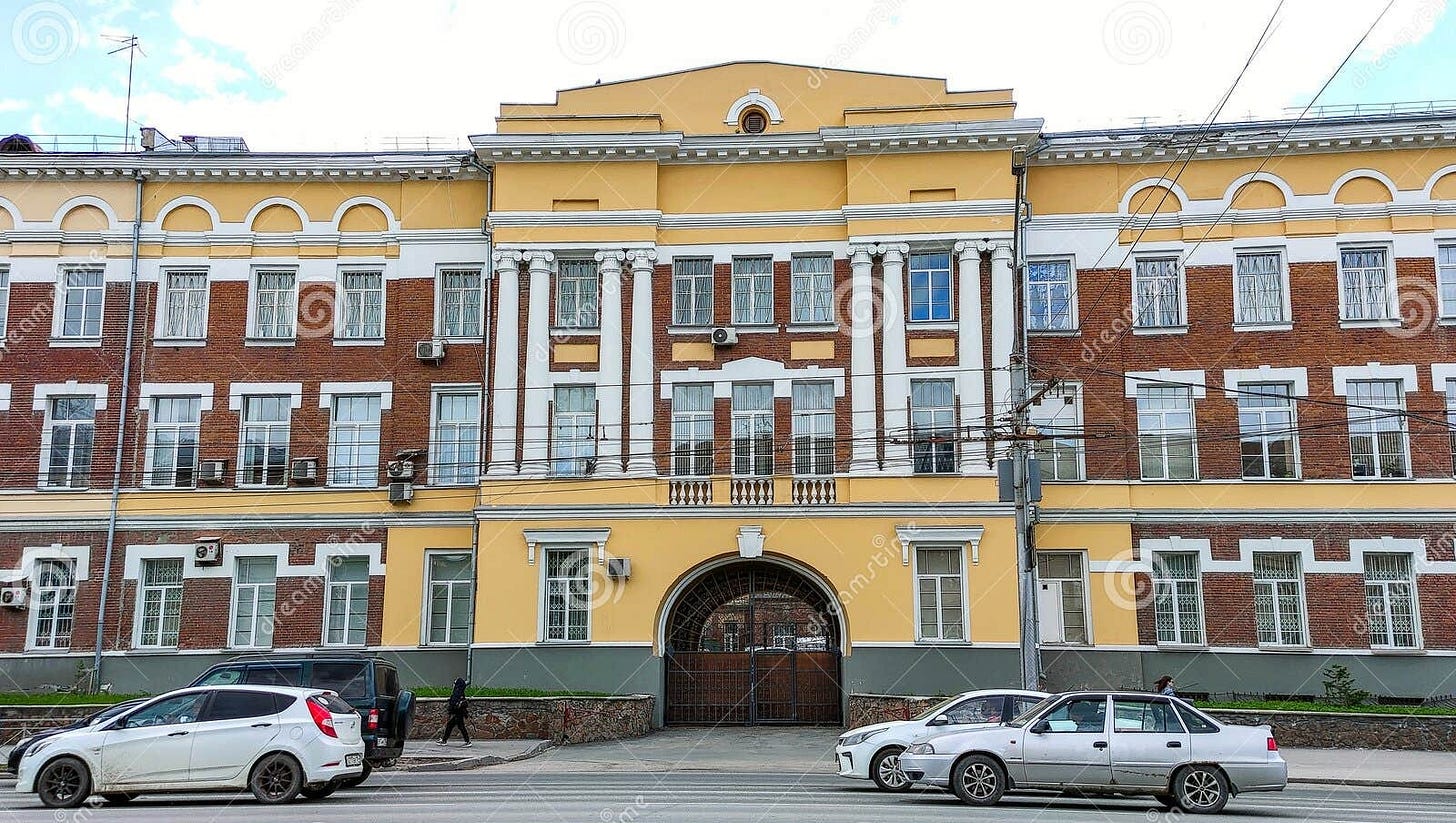


This article portrays what passes for logic in the russian mind.may i suggest what is happening in washington is somwhat similar.where does this lunacy end?
This article presents the future history of America under Trump and MAGA rule.